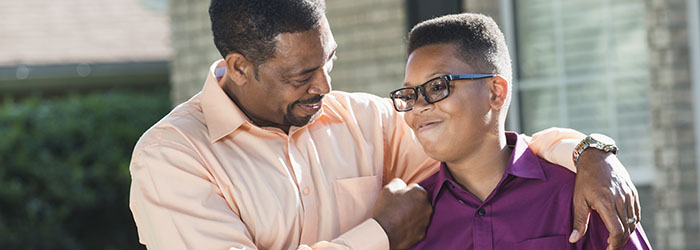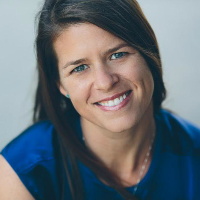“Dear Melody” is an advice column by Dr. Melody Moore, a clinical psychologist, yoga instructor and the founder of the Embody Love Movement Foundation. Her foundation is a non-profit whose mission is to empower girls and women to celebrate their inner beauty, commit to kindness, and contribute to meaningful change in the world. Dr. Moore is a social entrepreneur who trains facilitators on how to teach programs to prevent negative body image and remind girls and women of their inherent worth. Her work has been featured in the books Yoga and Body Image and Yoga and Eating Disorders: Ancient Healing for Modern Illness, as well as in Yoga Journal, Yoga International, and Origin Magazine.
What is the “right way” to talk to my child about their eating disorder, and how can I ensure that they are working toward recovery without being overbearing? I’m never certain as to what I should say or do, and I don’t want to say or do the wrong thing.
Thank you for asking this important question. I know you are not alone in feeling overwhelmed by the task of supporting your child in recovery. First, I can sense from your inquiry that you are invested and willing to do whatever is possible to be helpful. From the part of your child that is longing to heal and stay on the path to full recovery, thank you.
One tool that can be helpful as a framework for approaching conversations with your child is for you to mentally separate their eating disorder from who they are as a human being. In this way, you can honor their whole self by being in relationship with the myriad parts of them, as well as develop a conversation with the part of them that is struggling with an ED. See what I did there? Parts. Part of your child likely wants recovery, and part of them may not. It’s vital that you engage the part of them that is seeking health and freedom, while also being willing to see and, at times, to confront the part of them that is overtaken by an eating disorder. This can take some practice, but the outcome of honoring your whole child while also staying attuned to their relationship to recovery is vital.
With this framework of child here and ED there (within child, but not defining characteristic of child), some specific guidelines are these:
1. If your child is altogether resistant to your being a part of their recovery, let them know that you are a part of their support team. Tell them that you know that eating disorders are powerful and destructive forces, and that you recognize that it will take support, from you, from their treatment team, and from them in order to succeed in recovery. If they remain resistant, and if it would work for your family, consider setting up daily check-ins, such as 10 minute talks, where during that time there is a sacred space set aside for them to express how they are participating in their recovery that day. This way, your child knows that there is a fixed amount of time that is held open for them and can come to rely on the boundaries of space set aside specifically for this conversation.
2. Do not comment on your child’s appearance. Any verbalizations about them looking “better” or “more healthy” or “as though they’ve lost/gained weight” will very likely be misinterpreted and used to fuel their disorder. Instead, comment on behavioral observations. List specifically what you see them doing, instead of how you notice the way that they look.
And while you practice this, which will inevitably mean holding your tongue at times, also make sure that you remove all body talk from your vocabulary. That means not talking about your own weight, or the physical appearance of others, either. Any mention of size or weight will likely be triggering, and reinforce the idea that value is based on appearance.
3. Ask about how your child is doing and feeling, overall. Ask questions, be curious, and listen. Show your child that you are available to hold space for them to express their emotions to you. Do this by listening, not by naming how they feel to them, and not by trying to fix or control the issues that they are willing to share with you. Your child will be much more likely to open up to you if they feel that you are going to be respectful of their feelings without trying to control or invalidate or supersede them with your own strong or unregulated reactions.
4. Catch them doing something good, and offer them praise. So often, children in recovery feel as though plenty of people, including their doctors and dietitians, are commenting on what they aren’t doing well. Find anything that you can observe that is a healthy choice for them (depending on their personality, this could mean more or less attention to their homework, or firmer or more open boundaries with their siblings or friends, etc.) and compliment them. Let them know you see their effort and applaud them for it.
5. Err on the side of overbearing versus what could potentially be perceived as un-invested or disinterested. Without knowing your child, I’m not certain exactly where the balance is, but if they live at home with you, it would be likely be supportive to them for you to have family meals, and for you to offer to be involved in whatever preparations, including buying and cooking food, that would be helpful to them. Ask your child what would benefit them most, and trust your instincts. At the risk of them feeling like you are being overbearing, keep in mind the seriousness of this disease, and the likelihood that they are in more need of your support than they are able to express.
In addition, if you are not in family therapy, and if it’s a financial possibility for you, I strongly recommend that you and your child and any other members of your family attend therapy, together, with a therapist that specializes in eating disorder recovery. As a caregiver, you need support, too! In addition, family therapy is a space where your whole family can come together in understanding the causes of your child’s disorder and the necessary milieu for her full and complete recovery. This way, it isn’t just your child that is in treatment, it is the whole family system, which may serve to help them feel both supported and less identified as the “problem,” which sometimes happens when only the person with a presenting illness is in therapy.
I hope this letter has been helpful to you. Other resources, such as Carolyn Costin’s Your Dieting Daughter and a newer book written by parents, therapists, and recovered clients called Does this Feel Familiar may provide additional insight. Take good care of yourself, make sure you have your own support system in place, and know that there is no way to get this exactly “right.” Your showing support and your showing up with consistency and with compassion is of immense benefit to your child’s recovery.






